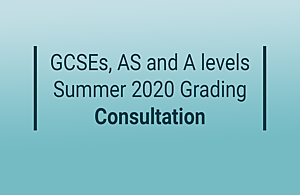Ofqual seeks views on GCSE and A level grading proposals for 2020
Consultation published on exceptional arrangements for awarding GCSEs, AS, A levels, Extended Project Qualification and Advanced Extension Award in maths.

Following the government’s decision to cancel exams to help fight the spread of Coronavirus (COVID-19), and that students should be provided with calculated grades this summer, we have set out exceptional arrangements for awarding GCSEs, AS and A levels, along with the Extended Project Qualification and the Advanced Extension Award in maths, so that as far as possible students are not disadvantaged by these unprecedented circumstances.
We have worked quickly to develop these arrangements so that schools and colleges know what is expected of them and that students can have their results in time to progress to further study or employment as planned. We have consulted with a variety of representative groups, and have sought views from those representing students. We explained when we published our information document that we would consult on some of the implementation decisions we must take, and changes to our regulatory framework. We have today (Wednesday 15 April) launched a consultation seeking views on the following.
Who should receive a calculated grade
Whether students entered for exams in year 10 or below should receive a calculated grade this summer
We set out in our information document that we considered the arrangements should only apply to students in year 11 or above, who needed grades to progress, and that we would consult on this view. We have since received representations from centres, parents and others indicating that the progression of some such students would be disrupted if they were not awarded a grade this summer, and to exclude them would have an unfair impact. We now consider the fairest option is that results should be issued for students in year 10 and below who anticipated sitting exams this summer and we are seeking views on this proposal.
The impact of our proposals on private candidates
In line with our information document, we propose that exam boards should issue results for private candidates for whom a Head of Centre can confidently submit a centre assessment grade and include the student in their centre’s rank order. Other private candidates will have studied with an established provider, such as a distance learning provider that is also an approved exam centre and might similarly be able to receive a calculated grade. However, other private candidates will have no existing association with an exam centre. Exam boards are exploring, with us, whether it might be possible for some centres, such as those with particular experience of working with distance learners, to work with those private candidates who need a grade this summer in order to progress. The centre might be able to submit centre assessment grades and a rank order for those candidates, even though there is no existing relationship between the centre and the candidate by considering a range of evidence about their likely attainment. We do not yet know whether this will be possible, or how many students will be able to receive a grade in this way. Exam boards will continue to work with us to explore all options for how such a process could work and will provide an update on this no later than 30th April
Standardising centre assessment grades
The aims of our approach to standardising grades and the principles which underpin it
For example, the document sets out our proposals to address key questions such as:
- how should we use statistical evidence to identify and adjust overly generous or harsh centre assessment grades?
- should evidence of changes in a school or college’s past performance inform our interpretation of this evidence?
- how can any issues of bias be addressed through statistical adjustment?
Our overriding aim is to make sure arrangements this summer are as fair as possible for all students. We are alert to concerns that unconscious bias could influence the grades schools and colleges might have expected their students to have achieved in the exams and assessments. Our consultation includes an equality impact assessment, of which we will take account when finalising these arrangements, and we have separately published a review of the research literature on bias in teacher assessments.
Appealing calculated grades
Whether appeals should include an opportunity to review:
- the centre’s professional judgements
- the procedures followed by the centre and/or exam board
- the outcomes of the statistical process
We explain in the consultation why we consider that, in the exceptional circumstances of this summer, appeals should only be allowed on the grounds that the centre made a data error when submitting its information; or similarly, that the exam board made a mistake when calculating, assigning or communicating a grade
The autumn exam series
We explain our proposals to allow exam boards to run an autumn series for those students who were entered for the cancelled summer series. We are still considering with government how the autumn series should operate, and will set out our proposals in a further consultation soon.
Putting in place the regulatory requirements
Proposals to suspend temporarily a number of the provisions in our current rules so that the exam boards can deliver the results in line with the exceptional arrangements necessary this year. We will also put some new regulatory arrangements in place to make sure all exam boards work in line with the agreed new arrangements so that, as far as possible, standards and public confidence in the qualifications are maintained
In light of the speed with which the arrangements must be finalised if students are to receive their results in good time, and no later than the dates originally published, this consultation will close on Wednesday 29 April 2020. We encourage everyone with an interest to read the proposals and respond.